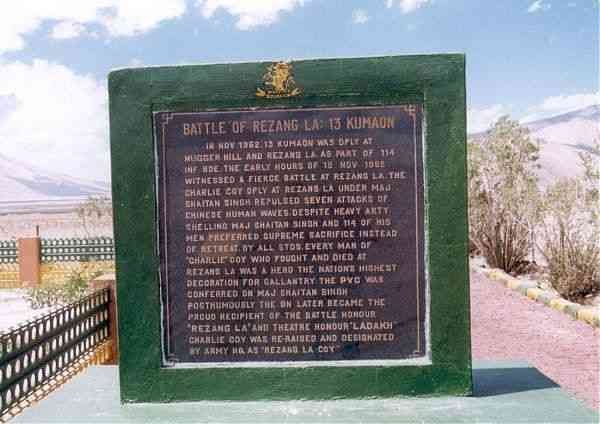Major Shaitan Singh Bhati, PVC (1 December 1924 – 18 November 1962) was an Indian Army officer and the recipient of India’s highest military award, the Param Vir Chakra. Singh was born in the state of Rajasthan. Singh joined the Jodhpur State Forces after finishing his degree. He was moved to the Kumaon Regiment following the incorporation of the princely state of Jodhpur into India. He was involved in operations in the Naga Hills and in India’s 1961 conquest of Goa.
The 13th Battalion of the Kumaon Regiment was stationed in the Chushul area during the 1962 Sino-Indian War. C Company, commanded by Singh, was positioned at Rezang La. On 18 November 1962, in the early morning hours, the Chinese
assaulted. After numerous failed frontal assaults, the Chinese launched a rear assault. The Indians fought till the last rounds before succumbing to the Chinese. Throughout the conflict, Singh walked from post to post, rebuilding the defences and bolstering his men’s morale. As he went between the posts without protection, he sustained critical injuries and eventually died of his wounds. Singh was given the Param Vir Chakra for his services on 18 November 1962.
Early life
Shaitan Singh was born on 1 December 1924 in a Rajput family of Bhati clan in Banasar village, Jodhpur district, Rajasthan. His father was Lieutenant Colonel Hem Singh. Lt. Col. Singh served in France with the Indian Army during World War I, and was awarded the Order of the British Empire (OBE) by the British government.
Singh studied in the Chopasni Senior Secondary School, Jodhpur up to his matriculation. At school, he was known for his skills as a football player. After completing his schooling in 1943, Singh went to Jaswant College, and completed his graduation in 1947. On 1 August 1949, he joined the Jodhpur State Forces as an officer.
Military career
After the princely state of Jodhpur was merged into India, Singh was transferred to the Kumaon Regiment. He was promoted to captain on 25 November 1955, and took part in operations in Naga Hills and also in 1961 Indian annexation of Goa. On 11 June 1962, he was promoted to the rank of major.
1962 Sino-Indian war
Main article: Sino-Indian War
There had long been disagreement between India and China over borders in the Himalayan region. To counter the increasing Chinese intrusions into disputed territory, then Prime Minister of India Jawaharlal Nehru asked for strategies for dealing with them. However, the proposal put forward by the Indian Army was rejected. Instead, he approved a plan proposed by a bureaucrat called the “Forward Policy”. This called for the establishment of a number of small posts facing the Chinese. Due to the severe rise in public criticism against Chinese intrusions, Nehru implemented the “Forward Policy” against the advice of the army. The army’s concern was that the Chinese had geographical advantage. Additionally, maintaining numerous small posts would be untenable if the Chinese superior forces attacked. This was ruled out by Nehru who believed the Chinese would not attack. But the Chinese did, initiating the Sino-Indian War.
Battle of Rezang La
The Charlie Company of the 13th Kumaon battalion was protecting the airfield in Chushul (which was important if India had to hold on to Ladakh) when the Chinese troops attacked the area on the morning of November 18, 1962. It was a group of more than 5000 Chinese soldiers holding position against 120 Indian soldiers. What followed was heavy firing from both the sides. Unlike the Indian soldiers, the Chinese were loaded with heavy artillery support but the Indian soldiers knew that there was no going back. They decided to fight the enemies with their bare hands when their ammunition finished and killed nearly 1300 Chinese soldiers. And all of this was done under the fearless supervision of Major Shaitan Singh.
Param Vir Chakra
For his actions at the Battle of Rezang La, on 18 November 1962, Singh was awarded the Param Vir Chakra. The official citation read:
Major Shaitan Singh was commanding a company of an Ahir infantry battalion deployed at Rezang La in the Chusul sector at a height of about 16,000 feet. The locality was isolated from the main defended sector and consisted of five platoon-defended position. On 18 November 1962, the Chinese forces subjected the company position to heavy artillery, mortar and small arms fire and attacked it in overwhelming strength in several successive waves. Against heavy odds, our troops beat back successive waves of enemy attack. During the action, Major Shaitan Singh dominated the scene of operations and moved at great personal risk from one platoon post to another sustaining the morale of his hard-pressed platoon posts. While doing so he was seriously wounded but continued to encourage and lead his men, who, following his brave example fought gallantly and inflicted heavy casualties on the enemy. For every man lost to us, the enemy lost four or five. When Major Shaitan Singh fell disabled by wounds in his arms and abdomen, his men tried to evacuate him but they came under heavy machine-gun fire. Major Shaitan Singh then ordered his men to leave him to his fate in order to save their lives. Major Shaitan Singh’s supreme courage, leadership and exemplary devotion to duty inspired his company to fight almost to the last man.
— Gazette of India Notification No.68—Press/62, (Cardozo 2003, p. 83)
Major Shaitan Singh was awarded the Param Vir Chakra posthumously for his unprecedented leadership, courage and determination, with five Vir Chakras and four Sena medals that were awarded to his fellow army men.
All this happened at a height of 16,000 feet in the freezing cold against the heavy attack from the enemy. But the Charlie Company of the 13th Kumaon battalion didn’t give up. For every man lost by us, the enemy lost four to five. And it’s commendable! It is no hidden fact that India’s defeat in the 1962 war was tragic but the sacrifice of Major Shaitan Singh and his men will always be remembered for their supreme courage and devotion towards their duty.




